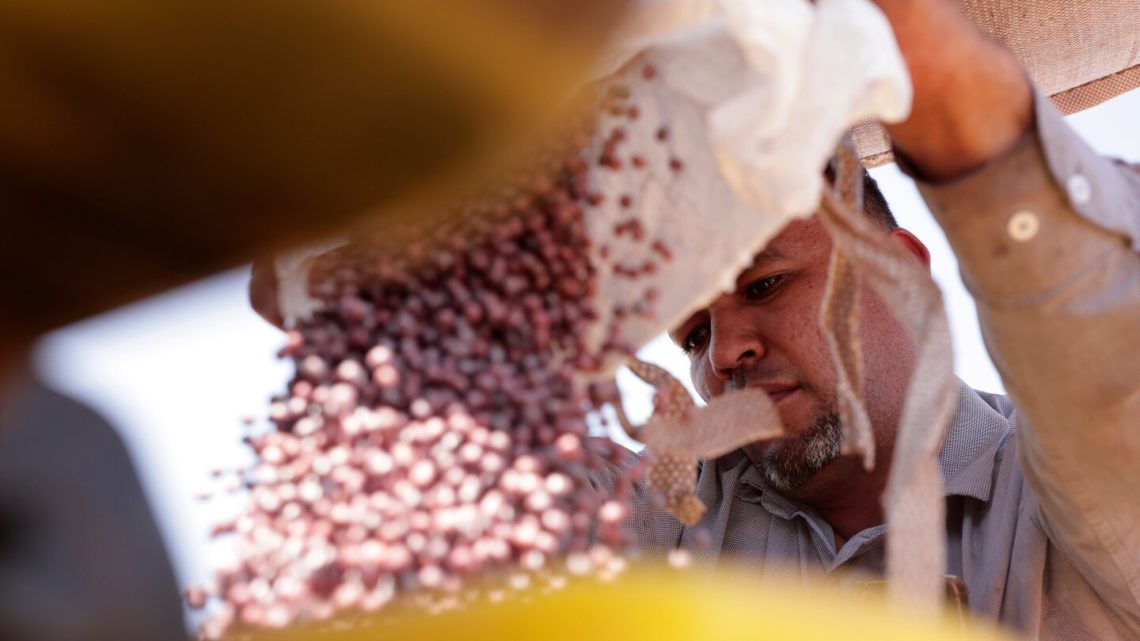SANTA CRUZ DO RIO PARDO, Brazil (AP) — Brazilian farmer Andrey Rodrigues wasn’t planning to beef up soybean production for next year’s harvest until a couple of months ago, but now he’s extra hopeful. What has him and his fellow Brazilian farmers planting more soybeans is the between the Trump administration and China that has of the massive Chinese market.
is actively seeking out Brazilian producers and the local trading companies that buy Rodrigues’ soybeans to sell to China have put the word out over the past two months that they will take all they can get, he said.
Just how much China will buy from remains to be seen, but China’s customs body said it did not import any soybeans from the U.S. in September. It’s the first time that’s happened since November 2018 when President Donald Trump launched his first trade war with China. Brazilian beans already accounted for more than 70% of China’s imports last year while the U.S. share was down to 21% even before the current trade dispute began, World Bank data shows.
Rodrigues, who chairs the soybean farmers association in Brazil’s powerhouse Sao Paulo state, is ramping up production at his Morada do Sol farm in the city of Santa Cruz do Rio Pardo.
The U.S.-China trade war “opens an opportunity for us here,” said Rodrigues, as he kicked off the highly mechanized process on his farm on a recent sunny day. “We need to be very aware in moments like this. Try to sell futures for the next harvest, seize this chance now.”
Brazilian hope
Brazil’s government said that between January and August, 77 million metric tons of soybeans were exported to China. That represents most of the South American country’s first season harvest.
During that period, China imported 17 million metric tons from the U.S., according to China’s customs data.
As the U.S. soybean harvest begins, there’s no indication that China is buying American.
The number of cargo ships carrying U.S. grains and docking at a major Chinese grains port fell 56% between January and September this year over the same period the previous year, or from 72 to 32, according to a social media account of the state broadcaster China Central Television. The number has fallen to zero since July.
By comparison, that port received an average of more than 40 cargo ships from countries such as Argentina, Brazil and Uruguay since May, and 90% of the cargo was soybeans, according to the state broadcaster’s post.
“China comes to us because of prices. Whenever they have higher tariffs in a given country, they come to us,” said Rodrigues.
The American Soybean Association said that China’s retaliatory tariffs on top of other taxes pushed the overall duties on U.S. soybeans to 34% in 2025, which has driven the price of American soybeans well above Brazil’s.
Brazil’s Agriculture Ministry said in October it expected the next soybean harvest, the one that Rodrigues is planting now, to rise 3.6%, to almost 178 million metric tons in comparison with this year’s. Now, government analysts are reviewing those figures as China’s increased demand doesn’t show signs of waning.
But Livio Ribeiro, a partner at consultancy BRCG and a researcher at the Getulio Vargas Foundation think tank and university in Rio de Janeiro, said the Chinese interest in Brazilian soybeans at this time of the year is a short-term move.
“(China) is retaliating against the U.S. and doing it with two alternative potential suppliers,” Ribeiro said. Brazil has an edge over Argentina, because Lula is not ideologically aligned with the Trump administration like Argentina President , he added.
“The West believed the U.S. was going to put its knee on China’s neck and that they would capitulate quickly,” Ribeiro said. “I think people understand now that this is not the game, because China has much more bargaining power.”
American pain
Kevin Cox said from his farm in Brazil, Indiana, that American farmers have to focus on selling more soybeans to other countries like South Korea and the Philippines while China isn’t buying and continue to invest in developing more uses for their crop at home like expanding production of biodiesel. He said when he traveled to China, buyers there told him that finding the lowest price was their priority.
“China’s proved that they don’t have a problem buying them someplace else,” Cox said.
The fear is that some farmers could go out of business as they deal with high costs and lower crop prices. But Minnesota farmer Glen Groth doesn’t think that will happen. He said “losing the Chinese market isn’t entirely unexpected nor is it seen as a complete catastrophe.”
“Weather changes, politics changes, and you’ve just got to deal with it,” Groth said.
Groth said he was able to sell his crop throughout the year at prices similar to last year with most of it floating down the Mississippi River about 10 miles (16 kilometers) away from his farm.
“We recognize that we’re going to be an adversary at worst with the Chinese and in a contentious relationship at best with the Chinese,” said Groth.
Political muscle
Brazil’s President is an ally of Chinese President and has pushed for China to buy more Brazilian goods.
But many soybean farmers like Rodrigues don’t care that Lula has stood up to . They credit their own work for their success, not Brazilian diplomacy trying to expand markets for their products.
And while farmers are excited by China’s interest at a time when they usually aren’t selling, an official from Brazil’s Industry and Trade Ministry cautioned that Beijing might wait before confirming purchases for the first half of 2026, because the price is higher now. That could be an incentive for Lula to seek other Asian buyers, said the official, who spoke to The Associated Press on condition of anonymity because they were not authorized to discuss the matter publicly.
Rodrigues, the Brazilian farmer, says he doesn’t want ideology to be part of the debate on tariffs.
“(American farmers) are being harmed and we have a temporary opportunity in Brazil. But let’s think more broadly. Growing and doing well while others are being harmed is not nice. There needs to be harmony,” Rodrigues said.
____
Savarese reported from Sao Paulo. Associated Press reporters Didi Tang in Washington, Josh Funk in Omaha, Nebraska, and Obed Lamy in Brazil, Indiana, contributed to this report.
The post Brazilian farmers beef up soybean production as China halts business with US during trade fight appeared first on Associated Press.




